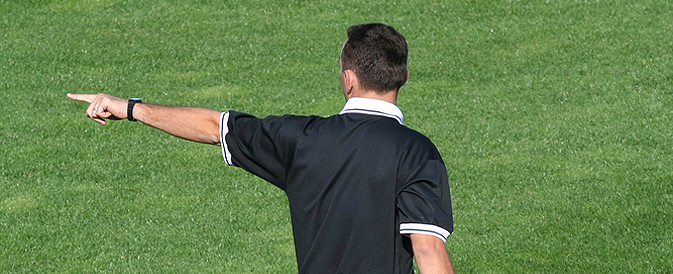How to Assist

-
5a. The Referee will require all the help they can get when dealing with any 'Bench' trouble. The Assistant Referee needs to be observant and absolutely certain who is involved and what has been said or done during periods of trouble from the ‘Bench’. Any mistakes in identifying the culprit, could affect both the Referee’s and Assistant Referees’ ability to control the rest of the game. The Referee should not ‘hide’ if an Assistant Referee colleague is having difficulty with any persons' within the ‘Bench’ area - or ground, including spectators. The Assistant Referee cannot act on his own and must allow the Referee to personally deal with any misconduct as the Referee deems fit.
-
5b. The Referee and Assistant Referee will need to consult each other away from prying ears before any action is taken.
When action has to be taken on the say-so of the Assistant Referee - it must be done as a team, with both officials approaching the ‘Bench’ together. The Referee is responsible for any necessary disciplinary action or warnings; the Assistant Referee should remain quiet and act as an observer. Removing any awkward official from the ‘dug-out’ into the stand may be sufficient to stop further trouble.
-
5c. If there is absolutely nothing happening in a game, it is very easy for the Assistant Referee to lose concentration on the field of play, and start ‘poking their nose’ into the ‘dug-out . DON’T go looking for trouble, because if you do, you’ll certainly find it on the ‘Bench’. The last thing a Referee wants is to get involved with the ‘Bench’. Don’t invite conversation or respond to alleviate any boredom.
-
5d. The Assistant Referee needs to develop a good rapport with the occupants of the ‘Technical Area’ without letting any conversation distract him from the main task of knowing exactly what is happening on the field of play.
-
5e. Assistant Referee’s must completely ignore any ‘wind-up’ comments about the Referee’s decisions on the field of play; the best response is to carry on as if nothing is being said - unless of course the comments are foul mouthed.
Questions and Answers:
Question. What is the actual rule for managers standing outside the zone in front of the technical area dugouts.
I have seen managers stand outside this area, yet the 4th official seemed to not really do anything about it.
One manager actually stood a few yards on the pitch, but this was during a substitution. So, is there actually any punishment for managers coming out of their area (I assume they can be sent from the touchline), and can they stand on the field of play, as long as the ball is dead?
Answer. The Law states that one team official at a time may convey tactical instructions to the players during the match and must return to his position after doing so. All team officials must remain within the confines of the technical area, where such an area is provided and they must behave in a responsible manner.
Tactical instructions may be given by different team officials during the match provided the person returns to his or her position after giving these instructions and behaves in a responsible manner. The occupants must stay within
the technical area, except in special circumstances, for example, a trainer entering the field of play to administer treatment to a player (with the Referee’s permission).
Punishing minor infringements can actually escalate problems. Football is an emotive game and passions will run high.
The Referee has the power to remove any occupant if the occupant’s behavior warrants it. They must behave themselves in a responsible manner. The Fourth Official is responsible for informing the Referee when the
occupants misbehave – but a great deal of man-management is required on the Fourth Official’s part to pacify irate managers etc. The number of persons permitted to occupy the technical area is defined by the competition rules.
But as with life, a modicum of common sense is applied when dealing with the technical area. This is a very difficult part of the Referee’s responsibility. It must be said, that when problems arise, they are created by the occupants. It is those occupants who have a responsibility to behave themselves, and when they misbehave, it is they who are a total disgrace. So let’s not blame the Referee for such behavior, or for using his man-management skills for dealing with infringements. We are talking about grown men here, who would not dream of behaving like this in the street or elsewhere in public. If they did, they would be locked up!
Courtesy Julian Carosi
